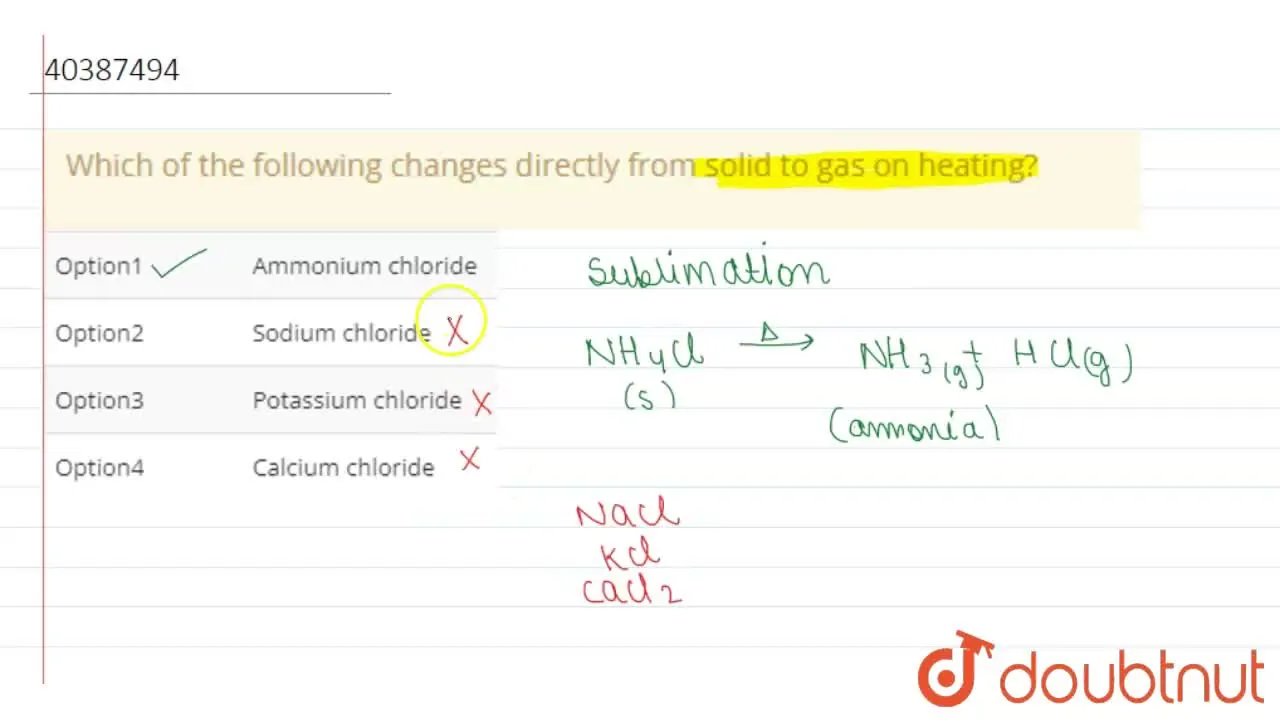Which of the following changes directly from solid to gas on heating?
Ammonium chloride
Sodium chloride
Potassium chloride
Calcium chloride
The correct Answer is:A, C
Ammonium chloride is a sublimable substance which changes directly from solid to gas on heating.
Related Playlists
- BOOK - PEARSON IIT JEE FOUNDATIONCHAPTER - CLASSIFICATION OF MATTEREXERCISE - Concept Application Level - 225videos
CLASSIFICATION OF MATTER
- BOOK - PEARSON IIT JEE FOUNDATIONCHAPTER - CLASSIFICATION OF MATTEREXERCISE - Concept Application Level - 310videos
CLASSIFICATION OF MATTER
- BOOK - PEARSON IIT JEE FOUNDATIONCHAPTER - CLASSIFICATION OF MATTEREXERCISE - Match the following1videos
CLASSIFICATION OF MATTER
- BOOK - PEARSON IIT JEE FOUNDATIONCHAPTER - CHEMICAL EFFECTS OF ELECTRIC CURRENTEXERCISE - TRACK YOUR LEARNING-III1videos
CHEMICAL EFFECTS OF ELECTRIC CURRENT
- BOOK - PEARSON IIT JEE FOUNDATIONCHAPTER - COAL AND PETROLEUMEXERCISE - COMPETITION CORNER48videos
COAL AND PETROLEUM
Similar Questions
Which of the following halide will not give halogen gas on heating?
View SolutionWhich of the following compound gives paramagnetic gas on heating :-
View SolutionWhich of the following compound gives paramagnetic gas on heating :-
View SolutionWhich of the following gives nitrogen dioxide gas on heating ?
View SolutionWhich of the following metals directly combine with hydrogen gas to give a hydride ?
View SolutionWhich of the following salt directly give metal on heating :-
View SolutionWhich of the following on heating does not give nitrogen gas ?
View SolutionFive moles of an ideal gas is expanded isothermally from 5dm3 to5m3 at 300 K.Which of the following is incorrect about the gas?
(A) No heat is absorbed (or) reject by the gas
(B) There is no change in internal energy of the gas
(c) There is no change in enthalpy of the gas
(D) Pressure of the gas will be decrease by 1000 timesView SolutionWhich of the following on heating gives NO2 gas?
View SolutionWhich of the following anticipated changes is not directly associated with the greenhouse effect ?
View Solution


